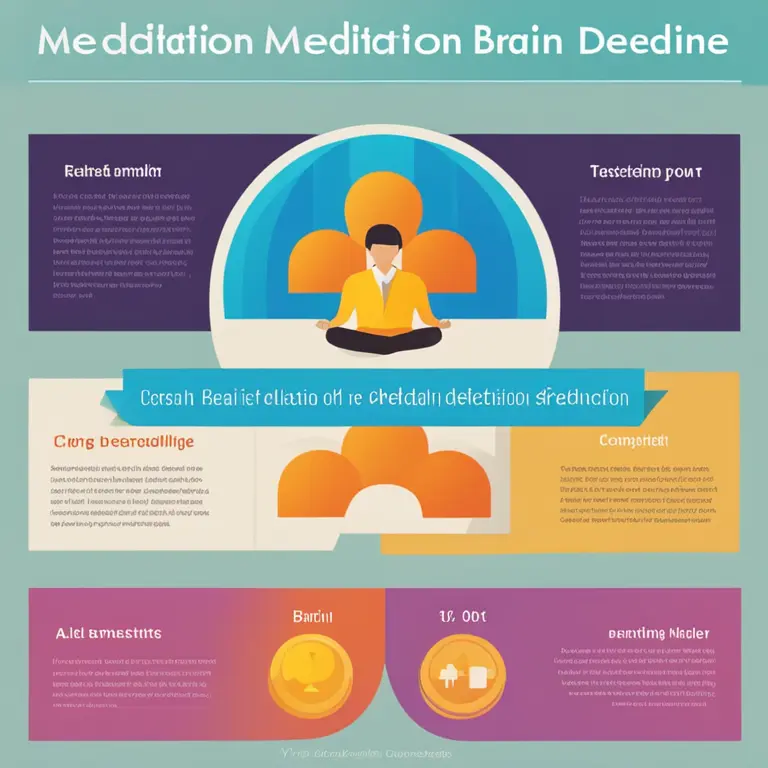
Meditative Mind: The Brain's Transformation Through Practice
Discover how meditation can reshape and revitalize your brain, enhancing mental health and cognitive function.
article by Hina Kurosawa
Meditation and Brain Structure
Meditative practices have long been revered for their calming and stress-reducing effects, but research delves deeper into how they can physically alter our brain structure. MRI scans reveal increased grey matter density in the hippocampus, known for its role in learning and memory, and in areas associated with self-awareness, compassion, and introspection. Additionally, a decrease in grey matter in the amygdala, which is involved in the processing of fear and anxiety, points to a biological basis for reduced stress responses in meditators.

Neuroplasticity and Cognitive Benefits
Neuroplasticity, the brain's ability to reorganize and form new neural connections throughout life, is significantly influenced by meditation. As we engage in this practice, the brain's plasticity enhances, leading to improved cognitive functions. Tasks requiring attention, problem-solving skills, and decision-making become more manageable, proving that consistent meditation can sharpen the mind and augment intellectual capabilities.

Emotional Regulation and Meditation
Meditation doesn't just influence the cognitive sphere—it also profoundly affects emotional regulation. Through the practice of mindfulness and focused attention, meditation cultivates an ability to detach from emotionally charged thoughts. This detachment is associated with a more measured response to negative stimuli and an overall better mood, contributing to enhanced emotional well-being. As meditators become adept at observing their thoughts without reacting, they can handle stress more effectively.

Impact on Age-Related Brain Decline
One of the more remarkable potential benefits of meditation is its impact on age-related brain decline. As we age, cognitive speed often diminishes, but studies suggest that those who meditate might buck this trend. Long-term practitioners have shown less age-related grey matter atrophy, indicating that meditation could be a powerful tool in maintaining a youthful brain and preventing cognitive decline.
Mindfulness and Metacognition
Metacognition, or the awareness of one's own thought processes, is another area enhanced by meditation. Through practices like mindfulness, individuals learn to observe their thinking patterns, leading to increased metacognitive awareness. This heightened awareness not only helps in recognizing unproductive patterns but also assists in consciously directing thoughts in more beneficial directions, potentially leading to improved mental health outcomes.
The Therapeutic Applications of Meditation
With mounting evidence on the variety of benefits, meditation is increasingly integrated into therapeutic practices. Mental health professionals are incorporating mindfulness exercises as a complementary treatment for a range of conditions, from anxiety to depression, and even post-traumatic stress disorder (PTSD). Its adaptability and non-pharmacological nature make it a holistic approach that can assist in managing mental health.
Future Frontiers in Meditation Research
As we move forward, the intersection between meditation and technological advancements such as neuroimaging continues to reveal its profound effects on the brain. Future research aims to unravel the complex neural mechanisms at play, offering deeper insights into how meditative practices can be tailored to maximize their benefits for individuals with different needs and conditions.
Published: 1/18/2024
Modified: 1/18/2024
More predictions
Come back here soon to learn more about yourself and your future


Unravelling Your Mindfulness Meditation Journey
Discover the steps to leading a successful mindfulness meditation session, enhancing emotional balance and tranquility.


Learn Your Mindfulness Meditation Journey
Learn the art of mindfulness meditation to foster calmness, clarity, and emotional balance in your daily life.


Exploring Your Mindful Meditation Journey
Learn to lead a mindfulness meditation with practical steps and techniques for a peaceful mind and balanced life.